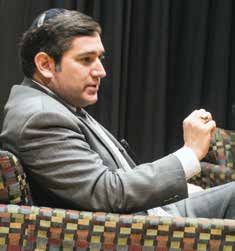Thursday, March 30, 5:45 pm
The Westin, Virginia Beach Town Center
Created in the spring of 2015 as a constructive response to the racial violence and civil unrest that took place in Ferguson and Baltimore, Hands United Building Bridges is comprised of Jewish, Christian, and Muslim clergy. HUBB’s goal is to forge relationships across racial and religious lines and to build bridges of mutual understanding in Tidewater.
At the 2017 Tidewater Humanitarian Awards Dinner, Virginia Center for Inclusive Communities will present the Distinguished Merit Citation Award to HUBB for its efforts to promote inclusive community connections.
HUBB was founded by Rabbi Jeffrey Arnowitz of Congregation Beth El and Dr. Antipas Harris, professor in the School of Divinity at Regent University and Theologian-in-Residence at First Presbyterian Church in Norfolk.
The challenge for clergy, Rabbi Arnowitz says, is to find the appropriate response. “The violence in Ferguson and Baltimore were several months apart and I remember feeling that is was very important, but I wasn’t sure how to respond. I was anxious to handle with care, anything that could be seen as political from the pulpit.”
Arnowitz contacted other faith leaders to discern if they, too, were having a similar experience and soon joined forces with Dr. Harris. “The theme that came up again and again was that our community was not so different. We have a tremendous level of de facto segregation, among our neighborhoods, not so much from city to city, but from neighborhood to neighborhood—and there is not a lot of communication between those different communities and there are a lot of assumptions between the communities.”
Arnowitz and Harris invited 20 faith leaders to meet to share concerns and garner new perspectives. Arnowitz says, “We wanted to become a hub for dialogue and exchange ideas.” It was decided “we should build bridges among ourselves first and then hopefully it would become organic—on how to approach these issues with our congregations. If anything should break out (racial unrest) in this area, we would know each other and be able to respond as an interfaith community.”
The group meets every 4 to 6 weeks to discuss a range of topics including education, race, poverty, the justice system, and policy making to share perspectives and find common ground.
“It has been wildly more successful than we could have ever hoped for. We initially had 20 people involved and now it is over 70,” says Arnowitz. “Antipas and I say it (HUBB) is the most selfish endeavor we have ever done, because maybe it is helping other people, but the two of us learn so much all the time and it has really been a great journey.”
Rabbi Arnowitz shares a quote from the Chasidic master, Rebbe Nachman, “All the world is a very narrow bridge and the main thing is not to be at all afraid.”
Reflecting on a possible interpretation, Arnowitz explains, “the bridge is narrow because only one person can pass over it at a time and if someone is coming in the other direction, you have a problem, therefore it forces cooperation.
“That is how I like to think of it, that ultimately the bridge is how we connect to each other—it is tenuous and little—maybe only able to hold one of our weights at a time but it is the cooperation between us that is going to get us across the bridge—one way or the other.”
Arnowitz suggests that communities need to reach out to each other, “What is the worst that can happen, you offend somebody? I don’t want to offend anyone, but the benefits of taking risk to make a connection are great…so the key is not to be afraid, walk the narrow bridge and then create one.”
To attend the dinner or purchase a table for a business or organization, visit www.inclusiveva.org, or call 804-515-7950. To purchase a seat at the United Jewish Federation of Tidewater/Tidewater Jewish Foundation table, contact Tammy Mujica at tmujica@ujft.org or 757-965-6124.
Sherri Wisoff

